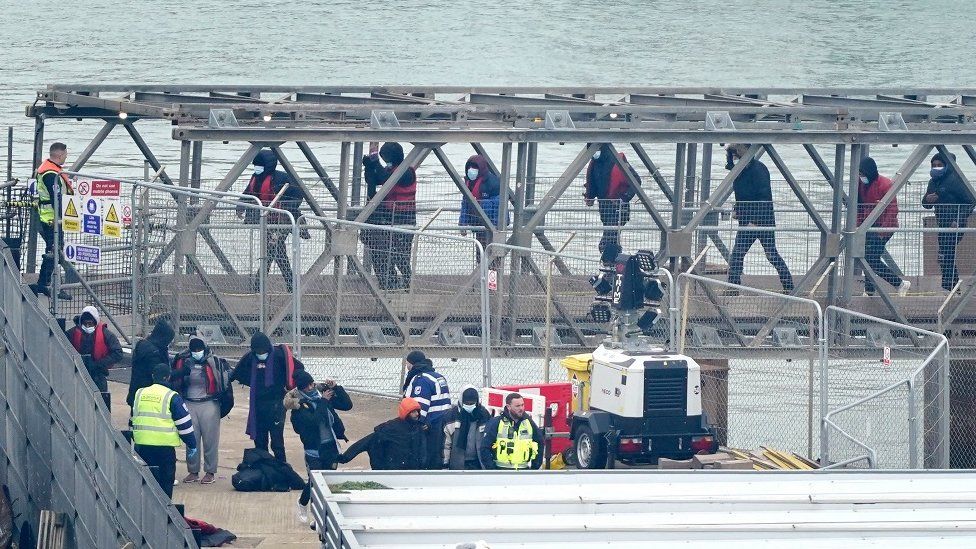ARTICLE AD BOX
 Image source, PA Media
Image source, PA Media
By Christy Cooney
BBC News
A new law will place a duty on the home secretary to remove anyone who enters the UK by an illegal route.
A bill expected to be introduced on Tuesday would also prevent those arriving illegally from claiming asylum or returning to the UK in future.
Writing in the Sun, Prime Minister Rishi Sunak said the plans were "fair for those at home and those who have a legitimate claim to asylum".
Labour leader Sir Keir Starmer described the plans as "unworkable".
More than 45,000 people entered the UK via Channel crossings last year, up from around 300 in 2018, leading to pressure on the government to tackle the issue.
Under the plans, the home secretary would have a duty to remove those who arrive in the UK illegally.
This "duty to remove" would take precedence in law over the right to claim asylum, although there would be exemptions for the under-18s and those with serious medical conditions.
Anyone removed would also not be permitted to return to the UK or seek British citizenship in future.
While the bill will not become law for several months it will apply retrospectively, meaning anyone arriving in the UK illegally from Tuesday will be at risk of deportation under the laws.
In an opinion piece for the Sun, Mr Sunak said the UK has a "proud history of welcoming those most in need" and the new measures were "fair for those at home and those who have a legitimate claim to asylum".
"Those arriving on small boats aren't directly fleeing a war-torn country or facing an imminent threat to life," he said.
"Instead, they have travelled through safe, European countries before crossing the Channel. The fact that they can do so is unfair on those who come here legally and enough is enough."
He added that the plans would "send a clear signal that if you come to this country illegally, you will be swiftly removed" and "help break the business model of people smugglers".
Speaking to the Daily Express, Home Secretary Suella Braverman acknowledged the bill would push "the boundaries of international law" but said it was necessary to "solve this crisis".
The plans have met with criticism from opposition figures and refugee groups.
Ministers expect this bill to cause a row.
It is perhaps the first row they have consciously picked since Rishi Sunak became prime minister, rather than walked into by accident.
It is, remember, one of the PM's five key promises. Three relate to the economy, one to the NHS and the final one is to "stop the boats".
It is the "last chance for the Conservatives to sort this," one insider acknowledges - and Tory MPs say it really matters to plenty of the voters they want to keep onside.
Speaking to LBC radio, the Labour leader said the issue of Channel crossings "has got to be dealt with" but "the only way to deal with it is to break the criminal gangs who are driving this".
Sir Keir Starmer said the National Crime Agency should be given the resources to set up a specialist unit to tackle the issue and that more should be done to speed up processing existing asylum applications.
Asked if the plan was legally feasible, Sir Keir - who is a former director of public prosecutions - said: "I don't know that it is and I think we've got to be very careful with international law here."
Numerous critics have also argued that, aside from schemes for people from specific countries such as Afghanistan and Ukraine, there are currently no safe and legal routes for most people to seek asylum in the UK.
The Liberal Democrats said the new law was "immoral, ineffective and incredibly costly for taxpayers while doing nothing to stop small boat crossings".
Enver Solomon, chief executive of the Refugee Council, said it would "shatter the UK's long-standing commitment under the UN Convention to give people a fair hearing regardless of the path they have taken to reach our shores".
Freedom from Torture, a charity which provides therapy to asylum seekers, described the measures as "vindictive and dysfunctional".

 1 year ago
20
1 year ago
20








 English (US)
English (US)